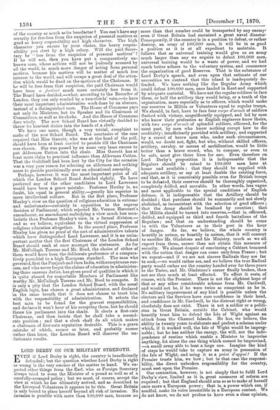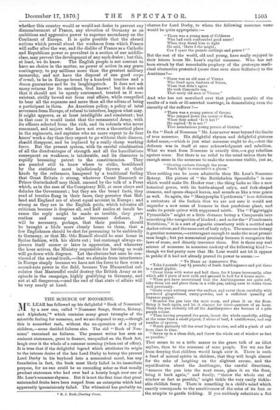dlways tried to seem the Minister of a proud as
well as of a Our contention, however, is not simply that to fulfil Lord 'carefully-arranged policy ; but we must, of course, accept the Derby's view, limited as it is, great measures of reform are of the country so much as its benefactor ? You can't have any more than that number could be transported by any enemy' security for freedom from the suspicion of personal motives so even if Great Britain had sustained a great naval disaster• good as heavy responsibility and high character. The high Consequently, if the country is in a position to defeat, or rather character you ensure by your choice, the heavy respon- destroy, an army of 100,000 men, it will be in as good sibility you rivet by a high salary. Will the paid Secre- a position as it is at all expedient to maintain. It tary be " free from the suspicion of personal motives" ? follows that as universal training would give us an army If he will not, then you have put a comparatively un- much larger than any we require to defeat 100,000 men, known man, whose actions will not be jealously scanned by universal training would be a waste of power, and we had all the world, in much more danger of acting from personal much better adhere to the voluntary system, and commence motives, because his motives will be matter of much less the organization of good Reserves. That is the substance of interest to the world, and will escape a great deal of the atten- Lord Derby's speech, and even upon that estimate of our
tion which would be fixed on the motives of the Chairman. If necessities we contend that this island is inadequately de- he will be free from that suspicion, the paid Chairman would fended. We have nothing like the Regular Army which have been a fortiori much more certainly free from it. could defeat 100,000 men, once landed in Bent and supported The Board have decided,—what, according to the Recorder of by adequate material. We have not the regular soldiers to face.
London, they can only rescind by a two-thirds' vote,—to have them, or half the artillery they would bring, or a tenth of the their most important administrative work done by an obscure, organization, more especially as to officers, which would make instead of a distinguished man. The House of Commons pays our reserves in Militia or Volunteers equal to regular troops, not only its Ministers, but its Speaker and its Chairman of We should, in fact, have to face four corps d'arme'e of soldiers Committees, as well as its clerks. And the House of Commons flushed with victory, magnificently equipped, and led by men does wisely. The new School Board has virtually decided to who know their profession as English engineers know theirs, throw its heaviest duties into the hands of a clerk. with two corps d'arme'e of splendid soldiers, officered, for the We have one more, though a very trivial, complaint to most part, by men who know nothing except how to die make of the new School Board. The courtesies of the case creditably; insufficiently provided with artillery, and supported required that Miss Garrett, who was at the head of the poll, by a crowd of brave men who, under such circumstances, should have been at least invited to preside till the Chairman would, we doubt not, fight, but who, without skilled officers, was chosen. She was passed by on some very lame excuse to artillery, cavalry, or means of mobilization, would be little put Alderman Cotton into the chair. Miss Garrett has at better than a brave crowd, who, to conquer, or even to least more claim to practical influence than Alderman Cotton. be safe, must give three lives for one. Even therefore on That the Guildhall had been lent by the City for the occasion Lord Derby's proposition it is indispensable that the was a very poor reason for selecting an alderman and nothing Regulars should be raised to 100,000 men here at more to preside provisionally over an educational assembly. home and available ; that they should be supplied with Perhaps, however, it was the most important point of all adequate artillery, or say at least double the existing force, which the London School Board decided rightly. To have and that, as it is conceivably possible even for British troops preferred any of the other candidates to Lord Lawrence to be defeated, their reserves should be thoroughly organized, would have been a grave mistake. Professor Huxley is, no completely drilled, and movable. In other words, less vague ;doubt, his equal in general ability,—greatly his superior in and more applicable to the special conditions of English mere intellectual culture. But in the first place, Professor defence, it is indispensable that the Artillery should be Huxley's view on the question of religious education is extreme doubled ; that purchase should be summarily and not slowly and unfortunate—certainly in opposition to the express abolished, as inconsistent with the selection of good officers ; decision of Parliament, which rejected Mr. Vernon Harcourt's that the Army should be localized by counties ; that amendment, an amendment embodying a view much less secu- the Militia should be turned into reserves,—that is, officered, laristic than Professor Huxley's view, in a formal division,— drilled, and equipped as third and fourth battalions of the and as we believe, equivalent to the virtual suppression of Regulars ; and that an understanding should be come religious education altogether. In the second place, Professor to with the Volunteers as to their post in the hour 'Huxley has given no proof of the sort of administrative talents of danger. So far, we believe, the whole country is portant matter that the first Chairman of the London School to sacrifice Mr. Gladstone and his Ministry, much as we all Board should rank at once amongst the statesmen. As for expect from them, sooner than not obtain this measure of Mr. McCullagh Torrens and Mr. Reed, the choice of either of security. We almost despair of convincing a Cabinet bemused anything, let alone the one thing which cannot be improvised, —a small army able to beat a large one. Imagine the kind LORD DERBY ON OUR MILITARY STRENGTH. of steps he would take to capture an army in possession of
whether this country would or would not desire to prevent any dismemberment of France, any elevation of Germany as an ambitious and aggressive power to supreme ascendancy on the Continent of Europe. It is quite possible that the absurd notions which prevail about the weakness from which France will suffer after the war, and the dislike of France as a Catholic and Republican power so prevalent in a section of our middle- class, may prevent the development of any such desire ; but this, at least, we do know. The English people is not content to have no choice in the matter, no power of action in any grave contingency, to pay millions more than the greatest military monarchy, and not have the disposal of one good corps d'armie, to be in Europe bound by a hundred treaties and a dozen guarantees and be its laughingstock. It does not ask many returns for its sacrifices, God knows ! but it does ask that it should not be openly contemned, treated as if non- existent, civilly bowed out from real affairs, while compelled to bear all the expenses and more than all the odium of being a participant in them. An American policy, a policy of total severance from Europe, of refusal to interfere, happen what may, it might approve, as at least intelligible and consistent ; but in that case it would insist that the ornamental Army, with its officers selected from the rich, and its colonels who never command, and majors who have not even a theoretical place in the regiments, and captains who no more expect to do four hours' work a day than they expect to go without their dinners, should disappear, and be replaced by a really cheap working force. But the present system, with its careful combination of all the disadvantages of strength and all the humiliations consequent on weakness, is intolerable, and its dharacter is rapidly becoming patent to the constituencies. They are puzzled still to know where to strike, bewildered by the statistics most injudiciously thrown at their heads by the reformers, hampered by a traditional feeling that Great Britain is strong, whatever Count Bismarck or Prince Gortschakoff may think, amused by the talk of a Press which, as in the case of the Conspiracy Bill, at once obeys and deludes the Government ; but they see the broad facts, they read of treaties flung in their faces, they perceive that Hol- land and England are of about equal account in Europe ; and strong as they are in the English pride, which tolerates all criticism because it despises all, and half smiles at insult be- cause the reply might be made so terrible, they grow restless and uneasy under incessant defiance. It will be necessary, perhaps, that their position should be brought a little more closely home to them, that a few Englishmen should be shot for presuming to be unfriendly to Germany, or that Mr. Odo Russell should be sent home in Syriac fashion, with his skirts cut ; but contempt always ex- presses itself sooner or later in oppression, and whenever the hour arrives, the Ministry responsible for leaving us weak will go down with disgrace. Let the electors but once be con- vinced of the actual truth,—that we abstain from interference in Europe simply because we have not the force to face even a second-rate power in the field, because Von Blumenthal cal- culates that Manteuffel could destroy the British Army as an episode in the campaign, highly gratifying to Germany, and not at all dangerous,—and the end of that state of affairs will be very nearly at hand.







































 Previous page
Previous page